Lost In Myth: The Lesson of “Dr. Linus”—What About You?
 For many of us, our lives don’t work out the way we planned. But that doesn’t mean that there isn’t a plan. It’s very apropos that Lost’s “Dr. Linus” episode was named for a teacher since it taught us some very valuable lessons about who we are and what our purpose here may be. In other words, it really was all about you.
For many of us, our lives don’t work out the way we planned. But that doesn’t mean that there isn’t a plan. It’s very apropos that Lost’s “Dr. Linus” episode was named for a teacher since it taught us some very valuable lessons about who we are and what our purpose here may be. In other words, it really was all about you.
Life can often be frustrating. We can work hard, have faith, follow the clues, be good people, make sacrifices for the greater good, and still find ourselves in pretty dismal circumstances. When reflecting on our lives, we may wonder where we went wrong, or, if we are being punished for some reason. Perhaps something we did in a prior lifetime─karma that finally caught up to us.
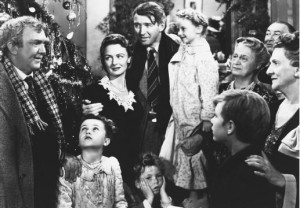 From our limited perspective, it may sometimes seem that our lives aren’t amounting to much. But like It’s A Wonderful Life, we usually just don’t realize how many lives we’ve touched─lives that were made better because we were in them or at least helped influence them in some way. We might feel like failures, but in fact, may have succeeded without even knowing it. It’s just that there is a bigger picture going on behind the curtain that is more important than our own wants and perceived needs.
From our limited perspective, it may sometimes seem that our lives aren’t amounting to much. But like It’s A Wonderful Life, we usually just don’t realize how many lives we’ve touched─lives that were made better because we were in them or at least helped influence them in some way. We might feel like failures, but in fact, may have succeeded without even knowing it. It’s just that there is a bigger picture going on behind the curtain that is more important than our own wants and perceived needs.
As Ben is told by Jacob at the end of “The Incident” it’s not about him. But it is about how he fits into the overall picture. That was why as Miles told Ben in “Dr. Linus,” Jacob continued to have hope for Ben right up until the very end. Hope that despite all of Ben’s hardships, much like the Biblical Job, he would keep the faith. So while Ben had given up on Jacob, Jacob never gave up on him. And this knowledge may have swayed Ben to return to Jacob’s side, despite his temptation from Jacob’s nemesis to join the dark side. Perhaps Ben had to go through all those hardships so that he could have the strong foundation to be able to make the tough choices he would need to make─choices that would drastically affect the lives of others.
In both his island life and parallel life, Ben had to make a choice between benefiting just himself or, someone else. And in both lives, he chose the more challenging, selfless path. Perhaps then, Ben is one of the good guys as he had claimed all along. So is there a message there? That whatever makes us who we are stays with us no matter what life situation we are placed in? Are there good souls and bad souls that will remain that way regardless of how their life turns out? Is there an inner-intelligence that determines what we are?
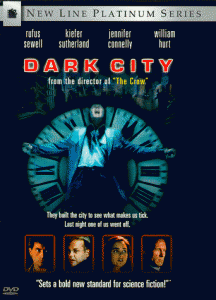 This question of what makes us who we are was the theme of the 1998 movie Dark City. In the film, a society of aliens has created an artificial world and placed Earthlings inside it with different professions and socio-economic backgrounds. Once the humans were comfortable in their respective lives, the aliens would change them around, complete with lifelong memories of their new life. Millionaires would become paupers, healers would become killers, cops would be criminals, and all of them would believe that this is what their life had always been. What the aliens were looking for was what stayed the same when they continually shuffled the people’s circumstances. Whatever this constant was, was presumed to be the soul, and this is what the aliens wanted to find. If you put people into different life situations, will the same people always be good while others are always evil? Or, will it depend upon the life situation they find themselves in?
This question of what makes us who we are was the theme of the 1998 movie Dark City. In the film, a society of aliens has created an artificial world and placed Earthlings inside it with different professions and socio-economic backgrounds. Once the humans were comfortable in their respective lives, the aliens would change them around, complete with lifelong memories of their new life. Millionaires would become paupers, healers would become killers, cops would be criminals, and all of them would believe that this is what their life had always been. What the aliens were looking for was what stayed the same when they continually shuffled the people’s circumstances. Whatever this constant was, was presumed to be the soul, and this is what the aliens wanted to find. If you put people into different life situations, will the same people always be good while others are always evil? Or, will it depend upon the life situation they find themselves in?
This element of what makes people who they are is also explored on Lost as seen through the flash-sideways, enabling us to see what stays the same when the characters are thrown into different life situations. In both parallel worlds, Kate is running away from her problems, Locke is angry at the world, Jack is dealing with daddy issues, Sayid is a killer, and Ben devises intricate plans to suit his Napoleon-esque power-hungry ego. This all comes down to the characters’ nature. But can it be changed, or at least, tweaked?
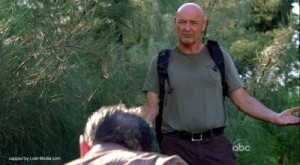 In both versions of his life, Ben feels that he hasn’t been treated fairly and therefore, has not been able to live up to his potential. Despite this belief, he still ends up making a sacrifice for the greater good. In one life he does this by giving up his blackmailed principal position in order to ensure his student Alex’s future. In the other, he gives up the power offered to him by MIB/Locke in order to return to help the side that he felt was the good one─a side that will have him despite his past transgressions. So does this mean that the villainous Ben Linus actually has a good soul? Yes…we all do. But some of us just have to clear away the crud that life has thrown at us in order to find it. A theme of Lost has always been that no one is truly bad or good. They just do what they think is right as seen through the filter of life that they have experienced.
In both versions of his life, Ben feels that he hasn’t been treated fairly and therefore, has not been able to live up to his potential. Despite this belief, he still ends up making a sacrifice for the greater good. In one life he does this by giving up his blackmailed principal position in order to ensure his student Alex’s future. In the other, he gives up the power offered to him by MIB/Locke in order to return to help the side that he felt was the good one─a side that will have him despite his past transgressions. So does this mean that the villainous Ben Linus actually has a good soul? Yes…we all do. But some of us just have to clear away the crud that life has thrown at us in order to find it. A theme of Lost has always been that no one is truly bad or good. They just do what they think is right as seen through the filter of life that they have experienced.
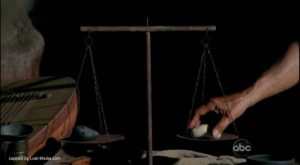 As seen in both timelines, the characters sometimes choose to do bad things, but usually it is the result of situations they are thrown into. Each choice they make helps determine who they really are─tipping the scale more towards the ego/selfish side, or the spiritual/selfless one. Dogen believed that Sayid’s internal scale had tipped too far towards “evil.” But everyone can be redeemed. In fact, no matter which side of the scale we are leaning, the universe will continually challenge us to grow with experiences that require us to make a decision about who we are. These decisions don’t change our soul, but can help us to get in touch with it. In some parallel versions of our life, we have grown ourselves by making a majority of choices that went against our selfish nature. In others, we’ve stayed pretty much the same by making an equal number of selfish and selfless choices. And in others, we’ve tipped the scale entirely towards the selfish side by usually choosing for just ourselves.
As seen in both timelines, the characters sometimes choose to do bad things, but usually it is the result of situations they are thrown into. Each choice they make helps determine who they really are─tipping the scale more towards the ego/selfish side, or the spiritual/selfless one. Dogen believed that Sayid’s internal scale had tipped too far towards “evil.” But everyone can be redeemed. In fact, no matter which side of the scale we are leaning, the universe will continually challenge us to grow with experiences that require us to make a decision about who we are. These decisions don’t change our soul, but can help us to get in touch with it. In some parallel versions of our life, we have grown ourselves by making a majority of choices that went against our selfish nature. In others, we’ve stayed pretty much the same by making an equal number of selfish and selfless choices. And in others, we’ve tipped the scale entirely towards the selfish side by usually choosing for just ourselves.
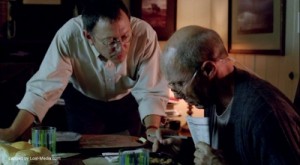 Ben’s father Roger Linus is someone who lives life full of regret in both of his timelines. On the island, he’s tipped the scale entirely towards the selfish side, blaming his son for the death of his wife and becoming an alcoholic in the process. In the parallel timeline, Roger blames himself for leaving the island, and while still relatively negative and regretful, seems to have a better relationship with his son. Not shown on Lost, but existing somewhere in the multiverse is a version of Roger Linus that is even stronger. Here, there is no blame at all, but acceptance. This version was able to accept his wife’s death and play the challenging role of both father and mother to his son. In “Dr. Linus” when Ben complained to his dad about the way his life turned out, instead of agreeing and being regretful about leaving the island, this version of Roger Linus would have commended his son for completing his doctorate, dedicating his life to helping others, and being able to take care of him in his old age. This stronger version of Roger Linus would’ve told his son that he was proud of him, just as Jack told his son in his parallel timeline.
Ben’s father Roger Linus is someone who lives life full of regret in both of his timelines. On the island, he’s tipped the scale entirely towards the selfish side, blaming his son for the death of his wife and becoming an alcoholic in the process. In the parallel timeline, Roger blames himself for leaving the island, and while still relatively negative and regretful, seems to have a better relationship with his son. Not shown on Lost, but existing somewhere in the multiverse is a version of Roger Linus that is even stronger. Here, there is no blame at all, but acceptance. This version was able to accept his wife’s death and play the challenging role of both father and mother to his son. In “Dr. Linus” when Ben complained to his dad about the way his life turned out, instead of agreeing and being regretful about leaving the island, this version of Roger Linus would have commended his son for completing his doctorate, dedicating his life to helping others, and being able to take care of him in his old age. This stronger version of Roger Linus would’ve told his son that he was proud of him, just as Jack told his son in his parallel timeline.
On Lost, it seems as though the decisions that the characters make on the island, influence their parallel lives. Island Hurely has risen above his belief of feeling like a jinx and is rewarded with good luck in the parallel timeline. Jack has taken a leap of faith by risking his life with Alpert and is beginning to accept that he has what it takes, enabling him to resolve his issues with his son in the parallel time. Ben’s selfless decision to return to Jacob allowed him to make another selfless decision for Alex. On the other hand, Sayid who has decided to kill on the island, eventually makes that same choice in his parallel life. Perhaps this is why he is not married to Nadia in this life, it is sort of his punishment because he does not “deserve” her. In both timelines, Sayid wants to be good but always makes the choice to kill. I personally feel that the choice was a bit unfair in the off-island timeline since he was kidnapped and Keamy had threatened his family, but hopefully, Sayid’s story doesn’t end there.
Overall, the message for us is that even though things may not appear to be going according to our plans, it is not our plans that necessarily matter. Despite how things may appear, we are part of a much bigger plan. Richard Alpert feels betrayed and misled by Jacob, dedicating multiple lifetimes to a plan that seems to have failed. Was all his hard work and dedication for nothing? Even if the plan doesn’t work out, the answer is no. The reason is because all his hard work was not ultimately about helping Jacob, but helping himself. Just as Jack thought that the lighthouse would be helping someone else, we come to learn that it was all for his benefit. Similarly, our journey through life isn’t about how we succeed in mastering the material world. It’s about how we succeed in mastering ourselves─overcoming our own selfish desires. And the better you do, the easier you’ll make it for everyone else.
If things have been particularly challenging for you, perhaps you just have more growing to do because you’ve taken on a more challenging role. Each time you are presented with a tough decision and make the more selfless, challenging choice, you’ll be presented with fewer of those types of decisions in the future. Make the more selfish choice however, and you’ll be presented with those same situations again and again.
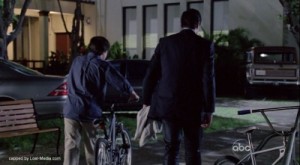 If you want to know how you’re doing, just look at your own life. What parts appear to flow smoothly and what parts feel like a broken record? Why does Sayid continually have to make decisions about killing? So he can choose to walk away from it. Why does Jack always end up in situations that he feels need to be fixed? So he can accept something even if it’s broken. Why does Kate always have something to run away from? So she can choose not to and settle down. Why does Locke always have crap happen to him? So he can learn not to react and be grateful for what he does have. Why did Hurley always experience bad luck? So he could learn how to make his own luck. Why did Claire keep having her baby taken away? So she could really want to raise it on her own. And why do you always have that same thing that always happens to you? Next time it happens and you’re about to act the same way you usually do, take the more challenging path. You’ll be one step closer to redeeming the main character of your life story.
If you want to know how you’re doing, just look at your own life. What parts appear to flow smoothly and what parts feel like a broken record? Why does Sayid continually have to make decisions about killing? So he can choose to walk away from it. Why does Jack always end up in situations that he feels need to be fixed? So he can accept something even if it’s broken. Why does Kate always have something to run away from? So she can choose not to and settle down. Why does Locke always have crap happen to him? So he can learn not to react and be grateful for what he does have. Why did Hurley always experience bad luck? So he could learn how to make his own luck. Why did Claire keep having her baby taken away? So she could really want to raise it on her own. And why do you always have that same thing that always happens to you? Next time it happens and you’re about to act the same way you usually do, take the more challenging path. You’ll be one step closer to redeeming the main character of your life story.
Marc Oromaner is a New York City writer whose book, The Myth of Lost offers a simple solution to Lost and uncovers its hidden insight into the mysteries of life. He can be contacted in the discussion section of The Myth of Lost Facebook page.
The Myth of Lost is available on Amazon and barnesandnoble.com.



One Response Leave a comment